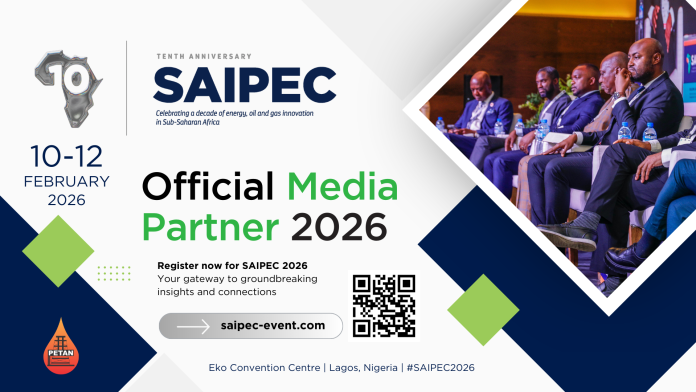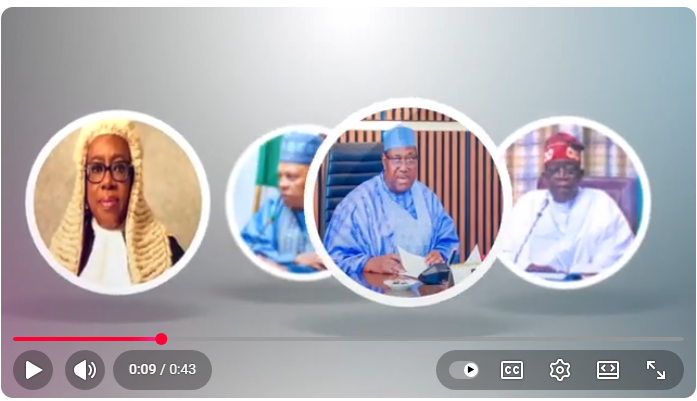The Petroleum Technology Association of Nigeria (PETAN) has announced the official programme for the 10th edition of the Sub-Saharan Africa International Petroleum Exhibition and Conference (SAIPEC), taking place from 10–12 February 2026 at the Eko Convention Center, Lagos.
Now marking a decade of convening Africa’s foremost oil, gas, and energy leaders, SAIPEC 2026 is once again hosted in strategic partnership with the Nigerian Content Development and Monitoring Board (NCDMB), NNPC Ltd, the Nigerian Upstream Petroleum Regulatory Commission (NUPRC), and AOS Orwell, alongside over 30 national oil companies, regulators, and government agencies from across Sub-Saharan Africa.
Ten Years of Growth, Partnership, and Impact
Since its inception in 2017 as WAIPEC – the West Africa International Petroleum Exhibition and Conference with just 148 delegates and the participation of two National Oil Companies (NOCs), SAIPEC has evolved into a truly pan-African platform, engaging over 1,400 delegates and 23 NOCs in 2025, with even greater participation expected in 2026.
The international exhibition has more than doubled in scale; from 35 exhibitors in its debut year to an anticipated 150+ exhibitors this February spanning exploration, drilling, engineering, digitalisation, and energy transition technologies.
Over the past decade, SAIPEC has facilitated millions of dollars in contracts and partnerships, driving projects and investments across Africa’s energy value chain. “From a regional platform to a continental force, SAIPEC has evolved into Africa’s leading meeting place for oil, gas, and energy dialogue,” said Mr. Ibe Chubby Ibe, PETAN/SAIPEC Conference Chairman. “Our tenth anniversary represents both a celebration and a call to action — to shape the next decade of sustainable growth through collaboration, innovation, and African content leadership.”
Charting Africa’s Energy Future: Inside the 2026 Programme
The opening day will feature welcome addresses from senior government and industry leaders, followed by keynotes reflecting on SAIPEC’s decade-long impact. A regulatory panel will assess how reforms and investment frameworks can unlock exploration and production growth across the continent. Country spotlight sessions will present upstream, midstream, and refining projects from key markets including Nigeria, Angola, Ghana, Namibia, Senegal, and Mozambique. The Investment Forum will focus on capital deployment, risk management, and financing mechanisms for new energy ventures.
The second day will explore “Africa’s Gas Opportunity – A Pillar for Industrialisation and Export.” Sessions will evaluate the continent’s LNG outlook, domestic gas infrastructure, and regional collaboration. Panels on local content and indigenous capacity building will highlight policy frameworks, project implementation, and supplier development strategies. The day will culminate in the 10th Anniversary Gala Dinner and SAIPEC Awards, honoringng industry leaders and long-term partners driving Africa’s energy growth.
The final day will turn to the workforce of the future, opening with a keynote on diversity and leadership transformation. The DEI Leadership Panel will spotlight women and youth advancing in technical and leadership roles, followed by the SPE Futures Forum, connecting young engineers, academics, and entrepreneurs.
SAIPEC 2026 will close with a presentation of actionable outcomes, policy insights, and collaboration pathways for the next phase of Africa’s energy transformation.
New Features for 2026
New for this edition, SAIPEC introduces in-country roundtables, a Local Content Pitching Session, and an expanded technical conference, offering deeper insights into engineering, project execution, and technology trends.
Networking remains a cornerstone of the event, with exclusive receptions, business lunches, and PETAN’s signature golf day designed to foster partnerships and investment discussions. The international exhibition will serve as a live showcase featuring digital solutions, field optimisation tools, and sustainability-driven innovations redefining Africa’s energy operations.
In addition, and as part of the extended 10th Anniversary Celebratory Week, the Nigerian Content Development and Monitoring Board (NCDMB) will host the Local Content – African Continental Free Trade Agreement (AfCFTA) Energy Summit on 9 February 2026, serving as a prelude to SAIPEC 2026. The Summit will explore the opportunities AfCFTA presents for strengthening intra-African energy trade and advancing local content participation across the continent.
With vast hydrocarbon reserves, expanding gas potential, and a growing drive toward renewable integration, Sub-Saharan Africa remains central to global energy diversification. For ten years, SAIPEC has played a critical role in driving collaboration, investment, and knowledge exchange across the continent’s energy markets.
SAIPEC 2026 will once again unite policymakers, operators, investors, and innovators to define Africa’s energy future ensuring growth that benefits its people and economies.
The full SAIPEC 2026 Programme is now available to download at www.saipec-event.com.



